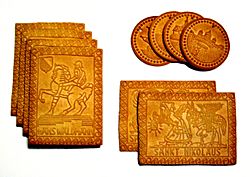Tirggel facts for kids

Industrially manufactured tirggel as sold by Swiss retailer Migros in 2008
|
|
| Type | Biscuit |
|---|---|
| Place of origin | Switzerland |
| Region or state | Zürich |
| Main ingredients | Flour, honey, sugar, water |
Tirggel are special, traditional biscuits from Zürich, Switzerland. People often enjoy them around Christmas time. These tasty treats are thin, hard, and sweet. They are made mainly from flour and honey.
Contents
A Sweet History
The first mention of Tirggel biscuits was in Zürich in 1461. Back then, they were called Dirgel. Since then, people have continued to make them in Zürich.
How They Were Made
Traditionally, Tirggel were made using special wooden molds. These molds had detailed carvings of stories from the Bible or scenes from the Zürich area. Today, many of these old wooden molds have been replaced. Newer molds are made from a strong plastic called polycarbonate. These are much easier to use. You can even see four of the original wooden molds at the Swiss National Museum.
How Tirggel Are Made
Making Tirggel starts with a simple dough. The main ingredients are flour, honey, a little sugar, and water. About 29 percent of the dough is honey! Some people believe that Tirggel were originally made without sugar. This might suggest they are very old, even from before Christian times.
The Baking Process
The dough is pressed very, very thinly into the molds. These molds come in many different shapes and sizes. The biscuits are baked in a super-hot oven. The temperature is about 400 °C (752 °F)! They only bake for about 90 seconds. Getting the timing just right is very important for a perfect Tirggel.
Enjoying Tirggel
Tirggel biscuits are quite hard and dry. The best way to eat them is to suck on them for a while. This helps the delicious honey flavor really come out.
Long-Lasting Treats
Tirggel are also known for lasting a very long time. A Swiss writer named Emanuel Stickelberger once said in 1939 that Tirggel "do not become stale." He also noted that "the harder it gets, the more enjoyable is it to nibble on." Because of their beautiful designs, many traditional Tirggel are not eaten right away. People often keep them as decorations for months or even years!
 | Leon Lynch |
 | Milton P. Webster |
 | Ferdinand Smith |

